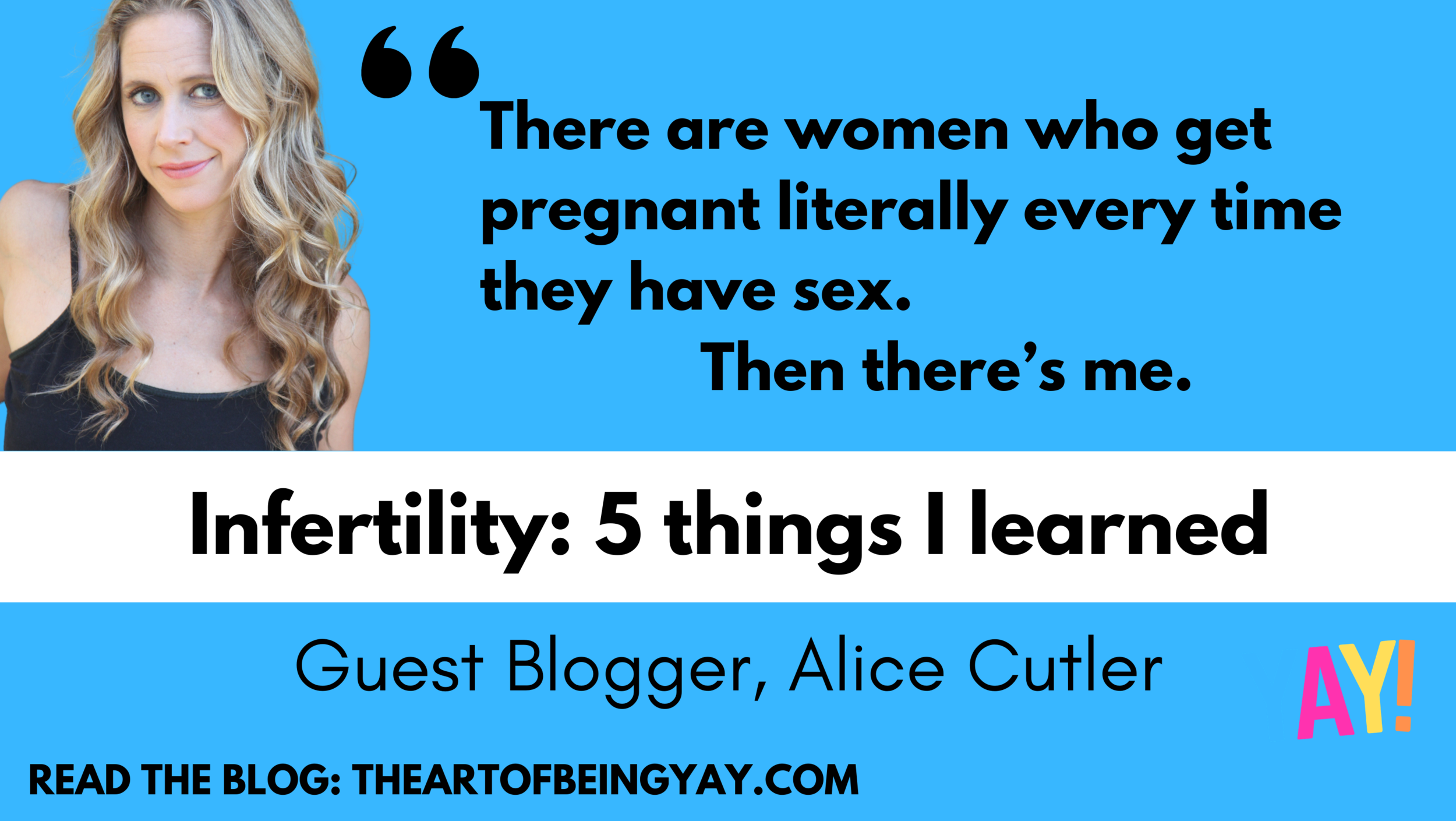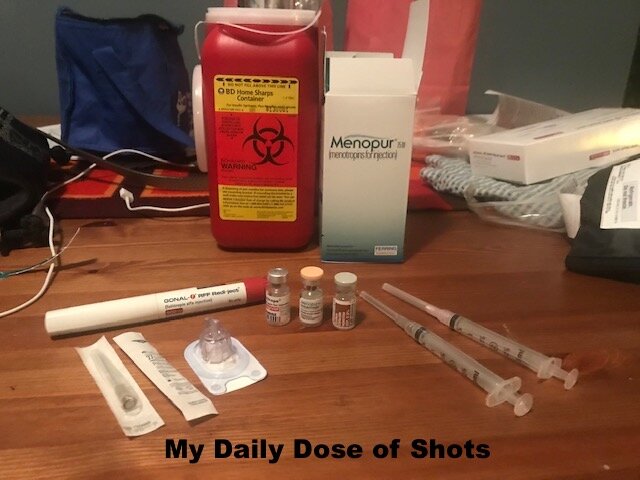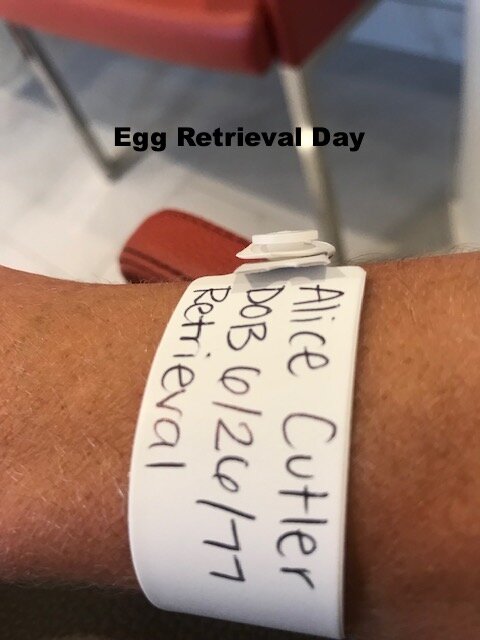Infertility: 5 things I learned
If you’ve seen my standup in the past few years, you probably know that I’ve struggled with infertility. I make jokes about, but underneath that humor there’s a lot of pain. I don’t talk often about it because I can tell it makes people uncomfortable. When I do talk about it, I’m usually making jokes. The fact is that going through infertility is by far the hardest struggle I’ve been through, which is probably why I don’t talk about it much.
Here’s a little background—my husband and I started trying to conceive shortly after getting married. Won’t this be fun?! (Hint: it’s not) I was in my late 30’s, but I figured I’m healthy so how hard can it be? Turns out, it’s very hard. Impossible, in fact ( or “improbable” as my doctor put it). We decided to try IVF. The first round failed. Then the second, then the third, then the fourth. After our last failed round, I was done. Not physically, but emotionally. I couldn’t handle any more heartbreak. I wasn’t mentally prepared for this kind of devastation. I went into it worried about giving myself shots, but that was the easy part. The hard part is what no one tells you—that often times IVF can lead to a lot of grieving, and there’s no real way to process that kind of grief. I went from being a positive, upbeat person to being just a shell of myself. What’s the silver lining? Well, there isn’t one, except that I grew a lot as a person. And I survived, which is actually a huge win.
5 Things I’ve Learned:
5) Find your tribe. This is a tough journey and most people don’t get it. The friends you may be used to leaning on might not be there for you. It’s not their fault—they just don’t get it. So find the ones who will. I went to support groups. I also found that some of my lifelong friends from high school and college gave me the support I needed and didn’t even ask for. I even found unexpected support from people who were just acquaintances but saw my struggle and reached out. Going through this type of struggle is unlike any other (not worse, just different) and it’s hard to ask for help. So find the people in your life who will show up at your darkest moments. These are the real friends.
4) Life isn’t fair. I’m generally a positive, half-glass full type of person. But sometimes life just isn’t fair. I went into my fertility journey thinking it would work. I was healthy and taking all the right steps, so why couldn’t I be pregnant, especially with the assistance of science? There’s no right answer to why, except that life isn’t fair. There are women who have no business being parents getting knocked up. There are women who get pregnant literally every time they have sex. Then there’s me. I did everything in my control to get pregnant, from special diets to acupuncture to everything in between, and I still just couldn’t get pregnant. I’ve accepted that life isn’t fair and these are the cards I’ve been dealt. Once I accepted that, I stopped blaming myself.
3) Pain is temporary. But it sneaks up on you and you’ll get through it each time.
Yes, we all know the saying that “pain is temporary.” If you’ve ever been to support group for anything, you’ve probably heard it. I had moments where I just didn’t think the pain would ever go away. I would sit in my car and cry uncontrollably, thinking I was so deep into depression that I could never get out of it. But I did. Eventually, the uncontrollable crying stopped. The debilitating depression stopped. At some point, I started wanting to socialize again. But don’t let it fool you. Pain never really goes away, it just distances itself. The triggers will sneak up on you. And that’s fine. We wouldn’t be human if we could put all our pain behind us and move on. But at least I now know that when it does sneak up on me, it will eventually pass and my life will go on.
2) Use your pain in your art. As the late Carrie Fisher said, “Take your broken heart, make it into art.” When I was doing IVF, I started writing jokes about it. It was very scary and I felt vulnerable. Yet somehow getting on stage and telling jokes about my infertility to strangers felt more comfortable than talking to friends about it. It was so cathartic to speak openly about it and to be able to laugh about it. I also felt that by opening up about it in my standup, I was making other women feel less alone. There were shows where there were women in the audience who would say, “I’ve been there, too!” One of the reasons I love standup is that I can make someone’s day better, even if just for 5 minutes. If I can give a woman in the audience permission to laugh about her infertility, I’ve been successful at my job. Not only that, but I feel that once I was able to be vulnerable onstage, I found my voice in standup.
1) It’s okay to be sad. We live in a society where we’re always supposed to smile and “have a nice day.” Some days just aren’t nice and a lot of times I don’t feel like smiling. And that’s okay. We shouldn’t view sadness as weakness, but rather an honest emotion in response to a life event. I felt incredibly sad for a very long time, and I don’t know how I could’ve felt any other way. I was given a lot well-intended encouragement like “it will work out” or “I just feel like you’re going to get pregnant, or the very worst, “everything happens for a reason.” These are the last things anyone wants to hear.
But we live in a society where we’re always trying to fix things and make people feel better. We need to stop thinking we always need to feel good. New Zealand recently
passed a law that gives women paid leave when they miscarry. And why not? Women need time to grieve. I was briefly pregnant, then I wasn’t (known as a “chemical pregnancy”). When I found out I was no longer pregnant, I went right back to work. I didn’t allow myself the time to grieve. I learned to compartmentalize my emotions, and that’s not healthy. Sometimes we’re just sad, and that’s okay.
By Comedian Alice Cutler
IG: @alicercutler
Twitter: @thealicecutler




